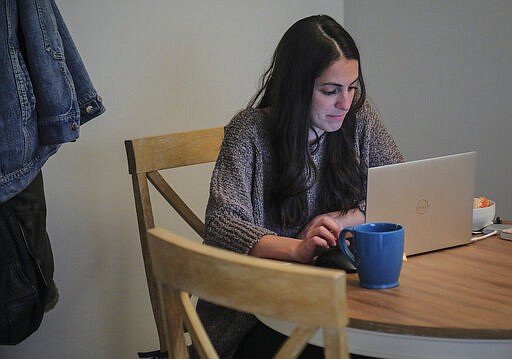Employers navigate virus pandemic without firm guidelines
NEW YORK (AP) — It started with extra hand sanitizer and wipes for keyboards and headphones. Then came the directive for employees to lug their laptops home every night just in case. Finally, the memo arrived urging all employees to work from home — just not in their pajamas.
The scene at New York real estate firm SquareFoot is playing repeatedly across the U.S. as workplaces make a mass shift toward allowing employees who can to work remotely in a bid to slow the spread of the coronavirus.
With no firm federal or local guidance on when or how to act, employers are weighing how far to take their own disruptive emergency measures as communities from New York to California shut down around them. And the millions who can't work from home face uncertainty as their workplaces see a business drop or shut down completely, from museums and concert halls to Disneyland.
Even for companies that employ mostly office workers, the sudden change is complicated. Not all client meetings can shift to phone or video. Employees lack laptops, security passwords or even the right ergonomic chair. Companies — and employees — are worried about a drop-off in productivity.
“Please do not treat this as a vacation,” SquareFoot's managers said in a memo, encouraging employees to change their clothes, sit at a table and get into “a routine that gets you into the mindset of work.”
Many companies have a mix of employees who can easily do their jobs remotely and others who can't.
Amazon — among other big tech companies — told much of its office staff to work from home, but workers who pick, pack and ship orders are still reporting to warehouses with extra hand sanitizers on the walls.
J.P. Morgan Chase has sent traders to back-up sites in New Jersey and Brooklyn because they require specialized work stations. The investment bank has split its New York-area employees into groups that will take turns working from home starting Friday, but employees at bank branches are expected on-site.
SquareFoot's employees also can't all be home-bound. The firm, which helps companies find office space, told its brokers to continue giving property tours to clients who want them.
SquareFoot Finance Director Lindsay Garfield, who spent two weeks stocking up on food, said she is relieved to be avoiding the subway. But she frets about the company's bottom line if clients stop going on property tours. One has already put off a search for space in New York City because of trouble getting on flights.
"I'm trying not to think about that,” said Garfield, who gets dressed in the morning and runs a quick errand to make herself feel like she's still “going to work.”
No legal standard for employers specifically covers disease outbreaks, according to the U.S. Occupational Safety and Health Administration, which enforces safe working conditions. Both OSHA and the Centers for Disease Control and Prevention have issued coronavirus guidelines for workplaces, including a recommendation to explore staggering shifts and allowing telecommuting.
Business owners trying to decide what to do are taking cues from their local communities, keeping abreast of the number of cases and measures like school cancellations and bans on large gatherings.
Eric Mitchell, CEO of the LifeFlip public relations firm in Portland, Oregon, first halted business trips and shifted client meetings to Zoom. Then he gave his 30 employees the option of working remotely. Finally, he sent them all to work from home.
Mitchell said ignoring the severity of the situation was impossible as cases mounted in Seattle, where he has an office. He also watched concern rise among his own clients, some of them NBA players whose world was upended when the season was canceled.
"I’m not going to bury my head in the sand and say it’s just like the flu,” Mitchell said. “I don't want to the one be blamed for infecting Tiger Stadium or something like that.”
The uncertainty comes in an era when missteps risk being amplified on social media or job recruiting sites. More than 150 posts mentioning coronavirus — most from workers angry at employers that failed to act beyond stocking up on sanitizing supplies — have appeared on Glassdoor, the website that allows employees to review companies anonymously.
Carina Cortez, chief people officer at Glassdoor, said there is “no one-size-fits-all approach” for employers except to be as transparent as possible. She said she quickly received request for keyboards, monitors and proper desk chairs after Glassdoor told its 1,100 employees across the world to work from home.
Hoelscher Gebbia Cepeda law firm in San Antonio, Texas, offered clients discount on hourly billing if they agree to phone or video calls, managing attorney Joseph Hoelscher said. But with some clients, especially older ones, struggling with Zoom and electronic documents, the firm designated a single conference room for in-person meetings, sanitizing it regularly.
Employees, too, have mixed feelings about working from home.
Garfield, of SquareFoot, said she gets more done without the constant office interruptions.
But Josue Ledesma, a content director for New York tech start-up Privacy Co., said it's hard to concentrate as he shifts from his bed and couch in his one-bedroom Manhattan apartment. He has computer on a desk for doing illustrations but his passwords and tabs are on his laptop.
“I'm definitely the kind of person who prefers face-to-face contact when it comes to work stuff," Ledesma said. “It's just easier when I can walk up to my boss and say, ‘What do you think of this?’”
___
The Associated Press receives support for health and science coverage from the Howard Hughes Medical Institute’s Department of Science Education. The AP is solely responsible for all content.








